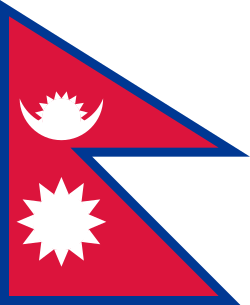नेपाल Nepal | |
|---|---|
 | |
| Capital | Kathmandu |
| Official languages | Nepali |
| Religion (2011 census)[1] |
|
| Population | |
• Estimate | 30 million[1] |
Minority groups (Tibetan Buddhists, Dalits) report additional local barriers. Restrictions:
| |
Nepal is constitutionally a secular republic under the Constitution of Nepal 2015, which defines secularism as the “protection of religion and culture handed down from time immemorial” and guarantees the right of individuals and communities to profess, practice, and preserve their faiths without state favoritism toward any religion.[2][3]
The 2015 Constitution and the subsequent 2017 Penal Code prohibit proselytism and the conversion of others, imposing penalties of up to five years’ imprisonment or fines, though personal conversion and private worship remain protected.[4][5]
With a population of approximately 30 million, Nepal's religious demography is dominated by Hinduism (81.3 %), followed by Buddhism (9.0 %), Islam (4.4 %), the indigenous Kirant faith (3.0 %), and Christianity (1.4 %), alongside smaller communities of Agnostics, Jains, Sikhs, and Baha’is.[1][6]
While the Government generally respects religious practice, national laws restricting proselytism have led to concerns among Christian and Muslim groups about discriminatory enforcement and limitations on religious literature and organizational registration.[7][8]
Minority communities—particularly Tibetan Buddhists and Dalits—face additional obstacles, including restrictions on public ceremonies and caste-based discrimination at places of worship, despite constitutional guarantees against such practices.[9][10]
In 2023, Nepal was scored 2 out of 4 for overall religious freedom, reflecting both its constitutional protections and the practical challenges posed by anti‑conversion laws and social discrimination.[6]
- ^ a b c "National Population and Housing Census 2011" (PDF). Central Bureau of Statistics, Nepal. Retrieved 8 May 2025.
- ^ "Constitution of Nepal" (PDF). Law Commission of Nepal. Retrieved 8 May 2025.
- ^ Country Update: Religious Freedom Conditions in Nepal (PDF) (Report). U.S. Commission on International Religious Freedom. 2023. Retrieved 8 May 2025.
- ^ "Challenges to Freedom of Religion or Belief in Nepal" (PDF). International Commission of Jurists. Retrieved 8 May 2025.
- ^ "Constitution of Nepal, Article 26". Refworld. Retrieved 8 May 2025.
- ^ a b "Freedom in the World 2023: Nepal". Freedom House. Retrieved 8 May 2025.
- ^ "2018 Report on International Religious Freedom: Nepal". U.S. Department of State. Retrieved 8 May 2025.
- ^ "Christian Solidarity Worldwide Country Report 2022: Nepal". CSW. Retrieved 8 May 2025.
- ^ "Forced Conversion and Discrimination in Nepal" (PDF). UN Special Rapporteur. Retrieved 8 May 2025.
- ^ "US State Dept 2021 Report on International Religious Freedom: Nepal". U.S. Department of State. Retrieved 8 May 2025.
© MMXXIII Rich X Search. We shall prevail. All rights reserved. Rich X Search

